The electoral threshold, or election threshold, is the minimum share of votes that a candidate or political party requires before they become entitled to representation or additional seats in a legislature.

The 2004 European Parliament election was held between 10 and 13 June 2004 in the 25 member states of the European Union, using varying election days according to local custom. The European Parliamental parties could not be voted for, but elected national parties aggregated in European Parliamental parties after the elections.
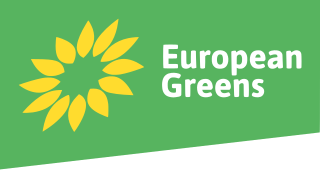
The European Green Party (EGP), also referred to as European Greens, is a transnational, European political party representing national parties from across Europe who share Green values.

The Movement for Rights and Freedoms is a centrist political party in Bulgaria with a support base among ethnic minority communities. It was a member of the Liberal International and the Alliance of Liberals and Democrats for Europe (ALDE). While representing the interests of Muslims, especially Turks and to a lesser extent Pomaks, the party also receives the largest share of Romani votes.

The Union of Democratic Forces is a political party in Bulgaria, founded in 1989 as a union of several political organizations in opposition to the communist government. The Union was transformed into a single unified party with the same name. The SDS is a member of the European People's Party (EPP). In the 1990s the party had the largest membership in the country, with one million members, but has since splintered into a number of small parties totaling no more than 40,000 members. The SDS proper had 12,000 members in 2016.

Romania elects on a national level a head of state – the president – and a legislature. The president is elected for a five-year term by the people. The Romanian Parliament has two chambers. The Chamber of Deputies has currently 330 members, elected for a four-year term by party-list proportional representation on closed lists. The Senate has currently 136 members, elected for a four-year term by party-list proportional representation on closed lists.

The 2009 European Parliament election was held in the 27 member states of the European Union (EU) between 4 and 7 June 2009. A total of 736 Members of the European Parliament (MEPs) were elected to represent some 500 million Europeans, making these the biggest trans-national elections in history. An additional 18 observers were pre-elected.

European Parliament elections were held in Bulgaria on 20 May 2007. It was the country's first European election, having joined the Union on 1 January of that year. The country still had 18 MEPs, no change from before the election. Until Bulgaria could hold these elections, the country was represented by MEPs appointed by the National Assembly.

GERB, an acronym for Citizens for European Development of Bulgaria, is a conservative populist political party which was the ruling party of Bulgaria during the periods between 2009–2013 and 2017–2021.

The election of the delegation from Bulgaria to the European Parliament was held on Sunday, 7 June 2009. As a result of the Treaty of Nice – that became active in November 2004 – the number of Bulgarian delegates in the European Parliament decreased from 18 to 17 delegates. When the Treaty of Lisbon was ratified, the number of Bulgarian Delegates increased to 18 again, giving a second seat to the Blue Coalition.
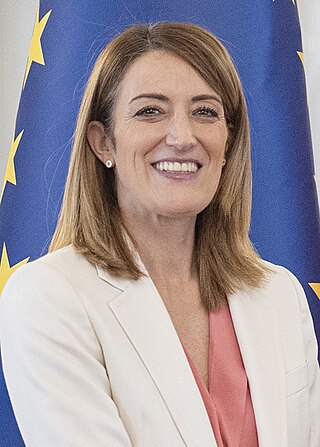
Roberta Metsola is a Maltese politician who has served as the president of the European Parliament since January 2022. She is a member of Malta's Nationalist Party (PN) and the European People's Party (EPP).

Green Movement, until 2019 The Greens, is a green-liberal political party in Bulgaria founded in 2008.

The sixth European Parliament was the sixth five-year term of the elected European Parliament. It began on Tuesday 20 July 2004 in Strasbourg following the 2004 elections and ended after the 2009 elections.

VMRO – Bulgarian National Movement, commonly known as VMRO, is a national conservative political party in Bulgaria.
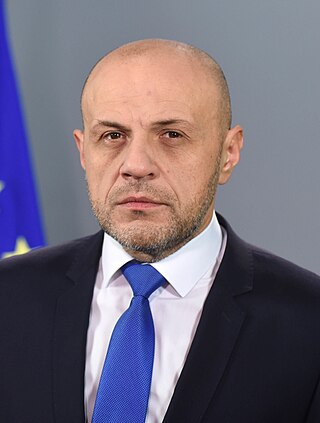
An election of the Members of the European Parliament from Bulgaria to the European Parliament was held on 25 May 2014 as part of the larger European Parliament election. After a decision by the European Council in 2013, Bulgaria was allocated 17 seats in the European Parliament for the Eighth European Parliament.

The Reformist Bloc was a centre-right electoral alliance in Bulgaria.
Yes, Bulgaria!, is a Bulgarian political party, founded in January 2017 by former Minister of Justice Hristo Ivanov. Yes, Bulgaria! is part of an electoral alliance with the Democrats for a Strong Bulgaria called Democratic Bulgaria.

Parliamentary elections were held in Bulgaria on 4 April 2021 at the end of the term of National Assembly members elected in 2017. Parties in the governing coalition led by Boyko Borisov lost seats and no party leader was able to form a coalition government within the time limit. This triggered the July 2021 Bulgarian parliamentary election.
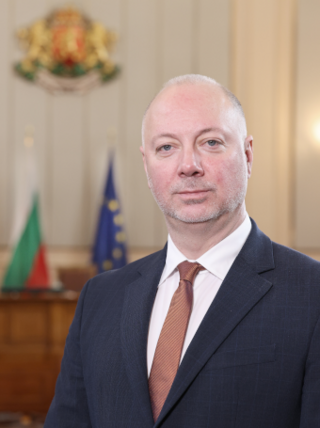
The 2024 European Parliament election in Bulgaria was held on 9 June 2024 as part of the 2024 European Parliament election. This was the country’s fifth parliamentary election since its accession to the EU in 2007, and the first to take place after Brexit. Bulgaria also held a separate national parliamentary election that day.
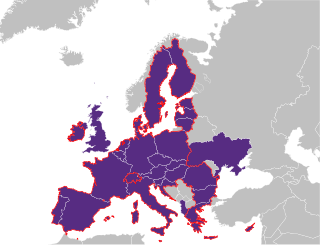
Volt Bulgaria is a social-liberal political party in Bulgaria. It is the Bulgarian branch of Volt Europa, a political movement that operates on a European level. It is currently part of the centrist electoral coalition We Continue the Change.
















